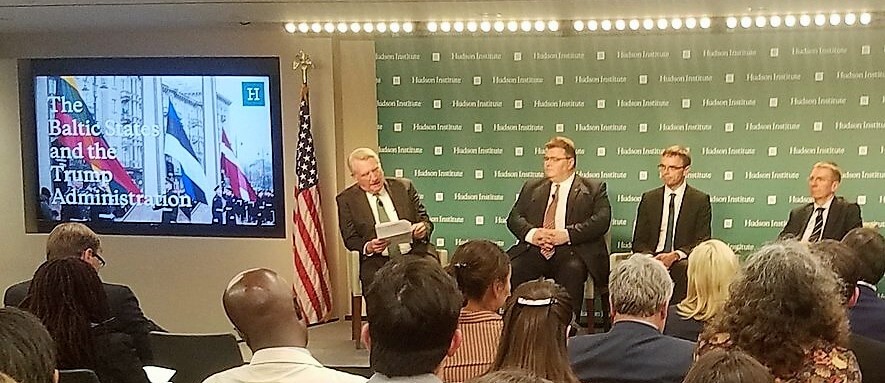
From left: John P. Walters (Hudson Institute), Minister Linkevicius, Minister Mikser, Minister Rinkevics. Photo courtesy of the Joint Baltic American National Committee
All three Baltic Ministers of Foreign Affairs were in Washington recently for meetings with the Administration, Congress and think tanks. Estonian Minister Sven Mikser, along with colleagues Edgar Rinkēvičs from Latvia and Linas Linkevičius from Lithuania, held discussions with numerous officials on U.S.- Baltic relations and reaffirmed the Baltic nations’ strong partnerships with the U.S.
Many of the points discussed during the week were summarized at an event on March 28th at the Hudson Institute, which established its relationship with the Baltic nations when it was the first Washington think tank to host the newly-appointed Baltic prime ministers back in 1991. This event presented the foreign ministers in a panel format to consider the topic of the Baltic States and the Trump Administration and share the results of their meetings so far.
They began their remarks by outlining their conversations with Secretary of State Rex Tillerson, Speaker of the House Paul Ryan and members of the House Foreign Affairs Committee, where U.S. officials reinforced their commitment to NATO and Article 5. The Baltic leaders noted that they have had good cooperation with administrations of both parties since the 1990s and have no doubt that it will continue. Both sides agreed that NATO needs to maintain the unambiguous message of deterrence established by the decisions made at the 2016 Warsaw Summit and that the multinational nature of the battalions deployed in the region shows that the Alliance is unified in doing just that.
While the Baltic leaders agreed that they won’t see a military altercation in their region despite the tendency of think tanks to speculate on the topic, several challenges were mentioned that require increased focus. Hybrid threats, particularly propaganda and information warfare, remain a primary form of aggression from the Kremlin. The ministers called for continued development of an organized, pragmatic approach and noted that the U.S. is coming to understand that it needs to address this threat. The eleven nations participating in the NATO Strategic Communications Centre of Excellence are targeting propaganda from Russia and ISIS and would welcome more U.S. involvement.
Another key challenge is increasing popular support throughout member nations for Article 5. There was consensus that Americans and Europeans value rules-based order and that the transatlantic community has benefitted from it. National leaders need to do a better job of explaining to their citizens the importance of NATO and Article 5 in preserving their democracies and the institutions they rely on.
While in Washington, the ministers also attended the March 22nd meeting of the Ministers of the Global Coalition in the Defeat of ISIS. They also met with members of the Senate Foreign Relations Committee. They finished their week in Brussels at the meeting of NATO Foreign Ministers on March 31st. Video of the Hudson Institute event is available at www.hudson.org/events.
Karin Shuey
Washington, DC Director
Estonian American National Council
www.estosite.org










